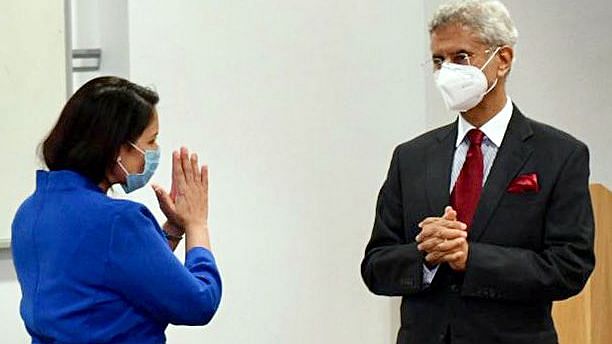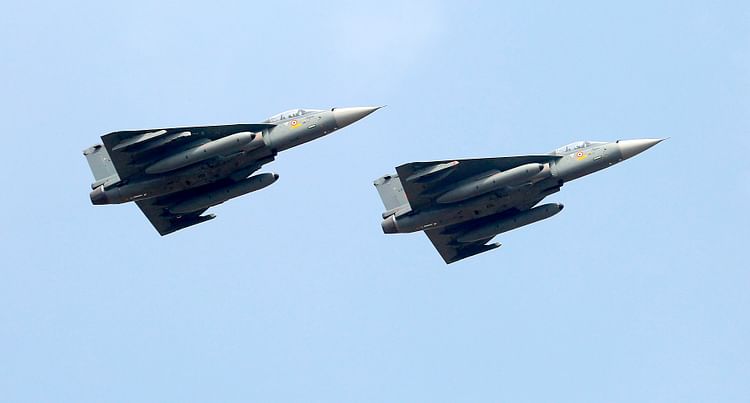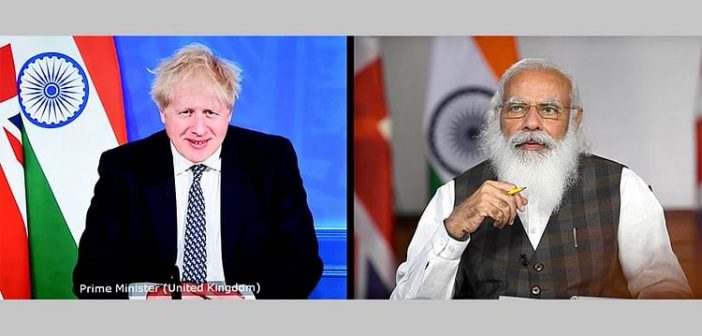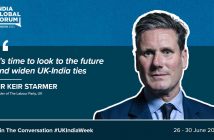The recent virtual summit between Indian PM Narendra Modi and his British counterpart Boris Johnson underlined ambition and enthusiasm like never before. Ties are at an ‘inflection point’ but much hard work lies ahead if we are not to fritter away this opportunity, writes India Inc Founder and CEO Manoj Ladwa.
Politicians love big moments like summits (in these Covid-affected times they are mostly virtual) to make big bold statements, announce new road maps and unveil ambitious vision statements. The announcements made at the virtual summit between Indian Prime Minister Narendra Modi and his British counterpart Boris Johnson this week were certainly bold and ambitious.
But a lot of it was also agreeing to agree, and we will try to figure it out later kind of stuff. To build on the momentum that such summits can generate in their immediate aftermath, the real work will have to start now.
Roadmap 2030 wants to elevate bilateral ties to a ‘Comprehensive Strategic Partnership’
To my mind, the most important outcome was the ambitious Roadmap 2030 that envisages elevating India-UK ties to a “Comprehensive Strategic Partnership.” What’s better is that the two leaders even fleshed out what this partnership might look like.
Modi tweeted: “We welcome the launch of an Enhanced Trade Partnership (ETP) as a roadmap to a comprehensive FTA, with a target to more than double the bilateral trade by 2030. We also agreed upon several new initiatives in health, technology, energy, etc.”
“Like every aspect of the UK-India relationship, the economic links between our countries make our people stronger and safer,” Johnson said after the summit.
Then, the two prime ministers also spoke about collaborating in the fight against the Covid-19 pandemic and also repeated their pledge on serious steps to meet the Paris Climate Goals in the run-up to COP26.
At an inflection point
“We’re at an inflection point,” India’s Foreign Minister Dr S. Jaishankar told me at a virtual interaction I hosted a day after the summit. “The new energy, the new thinking… it was very visible as you listened in to the discussions. We’ve had four big outcomes… and very detailed roadmaps, almost a sector by sector things you do across departments, across domains, across policies all the way till 2030.”
An FTA is still nowhere in sight
So, while there is definitely cause for optimism that the relationship is moving forward at last, the fact is that despite the signing of an ETP, a genuine Free Trade Agreement (FTA) is nowhere in sight.
This is predicable. India does not have a tradition of negotiating and agreeing FTAs in a hurry. But it has been focussed on incremental and tactical concessions with foreign partners on the basis of mutual give and take.
For example, every country or bloc that India is negotiating FTAs with – be it the US, the EU or the UK – wants New Delhi to give it easier access to India’s vast domestic market. But when India asks for easier entry norms for its professionals to live and work in those countries/blocs, it meets with stonewalling. Nonetheless, UK International Trade Secretary Liz Truss and her Indian counterpart, Piyush Goyal, have been asked to commence FTA negotiations within months.

MMP is a good beginning
In this context, the Migration and Mobility Partnership (MMP) agreement signed by India and the UK can be a good start. It will facilitate the movement of 3,000 young Indian professionals to the UK every year for employment purposes for a period of two years, in return for India agreeing to take back illegal immigrants.
I’d say MMP is a good beginning, but as I’ve written above, the real work to build on the momentum this will provide will have to start now.
Monumental effort needed to agree to a G2G framework
Since 2015, both sides have agreed to co-create defence technologies. This is a huge opportunity. But very little progress has been made by way of putting meat on the bone as far as a full-fledged framework is concerned, leaving issues such as IP management and ultimate use still hanging.
Going by the track record and the deeply conservative sector, it will take a monumental effort to agree to a G2G framework that both sides are comfortable with. But the potential prize for India’s indigenisation ambitions with Britain as a strategic partner are huge.

Britain to support development of Tejas Mark 2
In the context of the above, the fact that the two prime ministers “agreed to build on existing government-to-government collaboration on India’s future combat air engine requirement,” is definitely a cause for cautious optimism.
A British government statement after the summit on May 4 read: “As part of a ‘2030 Roadmap’, they agreed to work closely together in support of India’s indigenous development of the Light Combat Aircraft Mark 2 (Tejas). They also spoke of the potential for further industrial collaboration in areas like maritime propulsion, space and cyber, marking the start of a promising new era of UK-India research, capability and industrial collaboration on Indian combat air and beyond.”
Does this mean there’s going to be any forward movement this time? Will a British company like, say Rolls-Royce, now throw its hat into the ring for the co-development of an engine for this plane?
In the light of the upbeat statements of Modi and Johnson and in the context of Dr Jaishankar’s interaction with me, I would certainly hope so.
India and the UK are aligned and enthusiastic.
Never have the two countries been so aligned and enthusiastic. But now the work to convert that political will into reality will have to start immediately. And this will take both sides being innovative in how they work closely with business and other stakeholders to ensure that the chances of slippages between the lip and the cup are significantly reduced.







